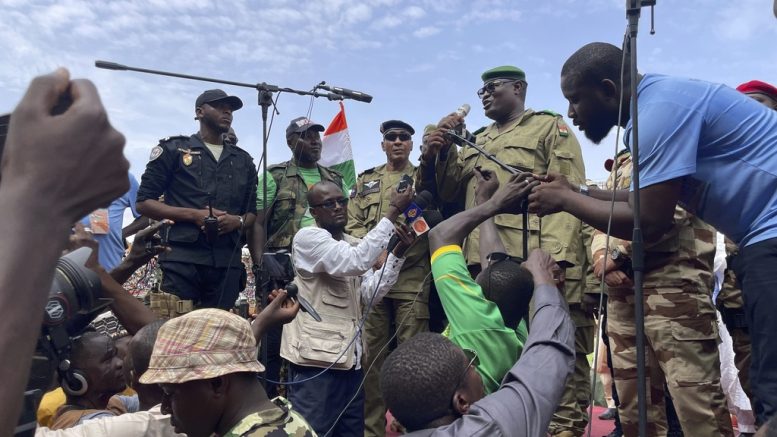US readying plans to evacuate drone bases if necessary under Niger’s new junta, commander says
By ELLEN KNICKMEYER Associated Press
WASHINGTON (AP) — The U.S. is making precautionary plans to evacuate two key drone and counter-terror bases in Niger if that becomes necessary under the West African nation’s new ruling junta. That word came Friday from the Air Force commander for Africa, Gen. James Hecker. The Air Force general stressed to reporters in Washington that there had been no U.S. decision to evacuate Niger, which has been the United States’ top counter-terror outpost in West Africa’s Sahara and Sahel regions. A July 26 coup there overthrew the country’s democratically elected president.
WASHINGTON (AP) — The U.S. is making precautionary plans to evacuate two key drone and counter-terror bases in Niger if that becomes necessary under the West African nation’s new ruling junta, the Air Force commander for Africa said Friday.
That planning includes looking for U.S.-allied nations in the Saharan and Sahel regions, some of the world’s most active areas for al-Qaida- and Islamic State-allied extremist groups, “that we could maybe partner up with, and then move our assets there,” Air Force Gen. James Hecker told reporters in Washington.
Hecker stressed that there had been no decision from the Biden administration regarding whether the Niger military’s July 26 overthrow of the country’s democratically elected president would compel U.S. diplomats or security forces to leave the country.
U.S. bases there have been vital counter-terror posts in an unstable region that is seeing an increasing number of coups as well as encroachment by Russia’s Wagner mercenary group. The U.S. presence includes air bases in Niamey, the capital, and in the remote city of Agadez on the southern edge of the Sahara.
If U.S. forces do leave, either following a decision by the Biden administration that it cannot work with the mutinous soldiers now leading the country or because the junta orders them out, “it obviously will have an effect” on U.S. intelligence and counterterrorism efforts, Hecker said.
“But of course what we hope for is that we have a peaceful diplomatic solution to this and we don’t have to” leave, he said.
The head of Niger’s presidential guard instigated the coup, and continues to confine President Mohamed Bazoum and his family in the presidential palace. U.S. diplomats say junta leaders have warned that Bazoum would be killed if Niger’s West African neighbors intervene militarily to restore Bazoum to power. Bazoum took office in 2021, in the coup-prone country’s first peaceful and democratic transfer of power since independence from France in 1960.
The U.S. has yet to formally call what happened in Niger a coup. That designation could compel Washington to cut many of the military and security ties between the two countries.
Hecker said he believed it would be “weeks or much longer” before U.S. officials would announce any kind of decision to evacuate, if it does come to that.
Niger had been one of a dwindling number of countries in West Africa’s Sahara and Sahel regions neither ruled by a military-backed government nor aligned with Russian mercenaries.
Hecker gave no details on what countries the U.S. was considering as an alternate West Africa counter-terror post, if Niger became unworkable.
“We’ve just started looking at that,” he said. American military officials “know where we would like the base to be, but more of that’s going to be diplomatic” in terms of how it’s decided.
The precautionary planning for evacuation, Hecker said, included scenarios where the Americans are able to move out at leisure and also where they have to depart in a hurry, taking only the most sensitive materiel.








































